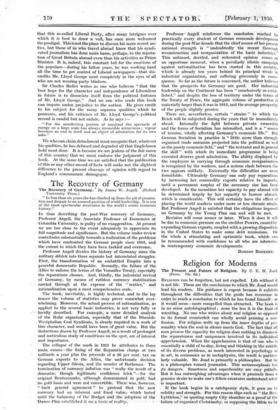The Recovery of Germany
" In less than six years she has climbed up from the pit of prostra- tion and despair to an assured position of world leadership. It is one of the most spectacular recoveries in the world's entire economic history."
IN thus describing the post-War recovery of Germany, Professor Angell, the Associate Professor of Economics at -Columbia University, is guilty of no exaggeration. At present we are too close to the event adequately to appreciate its full magnitude and significance. But the volume under review contributes substantially towards a realization of the problems which have confronted the German people since 1918, and the extent to which they have been tackled and overcome.
Professor Angell divides the history of Germany since the military &Mete into three separate but interrelated struggles. First, the transformation of an embattled Empire into a peaceful democratic Republic. Secondly, the failure of the Allies to enforce the terms of the Versailles Treaty, especially the reparations clauses. And, thirdly, the industrial revival of Germany, 'by means of ruthless currency stabilization carried through at the expense of the " rentier," and rationalization upon a most comprehensive scale.
The book,' inevitably, is highly technical, and to the lay reaner the volume of statistics may prove somewhat over- ' whelziaing. Moreover, the 'actual process of rationalization, as applied to the several basic industries, is not very fully or lucidly described. For example, a more detailed analysis -of the Ruhr organization, especially that of the Rhenish- Westphalian Coal Syndicate, is clearly required in a work of this character, and would ha've been of great value. But the deductions drawn by Professor Angell, as a result of prolonged
and meticulous study of conditions on the spot, are of interest and importance.
• The collapse of the mark in 1921 he attributes to three ' main causes—the fixing of the' Reparation charge at two
• milliards a year plus the proceeds of a 26 per cent. tax on German exports to the 'Allies, the unfortunate decision regarding Upper Silesia, and the murder of Rathenau. - The termination of currency inflation was " really the result of a dramatic, though • legitimate confidence trick "—for the original Rentenniarks,' although denmainated in gold, had 'no gold basis and were not convertible. - Them was, however, " tacit general agreement " to I pretend that the' new currency had an inherent and fixed value,- which lasted until the balancing of 'the Budget- and the adoption of the 'Dawes Plan established- it mr a basis -of Professor- Angell reinforces the conclusion reached by practically every student of German economic development during the post-War decade that the chief source of her present national strength is " undoubtedly the recent thorough reconstruction and -reorganization of the basic industries." This unbiased, decided, and reiterated opinion comes at an opportune moment, when a peculiarly idiotic campaign against rationalization has been started in this country, which is arready ten years behind its principal- rivals in industrial organization, and suffering grievously in conse- quence. So far as the future is concerned, the author believes that the prospects for Germany are good. Her industrial leadership on the Continent has been " conclusively re-estab- lished," and despite the loss of territory under the terms of the Treaty of Peace, the aggregate volume of production is materially larger than it was in 1913, and the average prosperity of the people slightly greater.
• There are, nevertheless, certain " strains " to which the Reich -will be subjected during the years that lie immediately ahead. Internally the fight between private ownership and the forces of Socialism has intensified, and is a " source of tension, vitally affecting Germany's economic life." But German Socialism in practice is " little more than strongly organized trade unionism projected into the political as well as the purely economic field," and " the restraint and in general the skill " with which its immediate programme is being executed deserve great admiration. The ability displayed by the employers in carrying through economic reorganization is recognized by the workers, and a serious clash between the two appears unlikely. Externally the difficulties are more formidable. Ultimately Germany can only pay reparations by increasing her commodity exports relative to imports, until a permanent surplus of the necessary size has been developed. In the meantime her capacity to pay abroad will be determined largely 'by her capacity to borrow abroad, which is considerable. This will certainly have the effect of placing the world markets under more or less chronic strain. But Professor Angell is satisfied that the obligations imposed on Germany by the Young Plan can and will be met.
Revision will come sooner or later. When it does it will be due to economic pressure on the creditor Powers, caused by expanding German exports, coupled with a growing disposition in the United States to make some debt remissions. On the whole a stimulating and optimistic book, which can be recommended with confidence to all who are interestcs: in contemporary economic developments.
ROBERT BOOTLIBT.






































 Previous page
Previous page